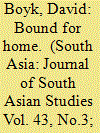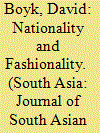| Srl | Item |
| 1 |
ID:
172226


|
|
|
|
|
| Summary/Abstract |
At the turn of the twentieth century, a group of young men in Desna, a qasba (small town) in Bihar, founded an organisation called the Anjuman Al-Islah. There they shared their books in the name of promoting education and cultivation, which they saw as ‘paramount in life’s every undertaking’ and essential to the defence of qasbati culture. Through sustained collaborative efforts, the Anjuman soon built up an impressive library of Urdu books and periodicals. Where other libraries were assembled at the initiative of aristocratic patrons or government officials, the Al-Islah library relied on the contributions of numerous Desnavis, both those who still lived in the qasba and those whose careers had taken them far away. In turn, the Anjuman and its library nurtured Desnavis’ ties to each other and to their watan, or homeland.
|
|
|
|
|
|
|
|
|
|
|
|
|
|
|
|
| 2 |
ID:
175485


|
|
|
|
|
| Summary/Abstract |
The Persianate genre of the tazkira, or biographical compendium, typically concerns poets and Sufi saints, but a different approach is taken in Yadgar-e Rozgar, published in 1931 by Sayyid Badr al-Hasan, an aristocrat and honorary magistrate from Patna. Hasan focuses on the ordinary people—landlords and courtesans, doctors and bakers, lawyers and counterfeiters—who made up Patna’s social world as the city transformed from a provincial town into the capital of a new province. While many Patnaites celebrated these changes, Hasan was deeply ambivalent about the dilemmas of colonial modernity. He struggled to reconcile modernist ideals with his sense that older ways were essential to Patna’s cohesion and distinctiveness. As he worriedly put it, ‘Asian breeding’ had been replaced by a fickle disregard for social norms, as ‘nationality’ increasingly gave way to ‘fashionality’.
|
|
|
|
|
|
|
|
|
|
|
|
|
|
|
|